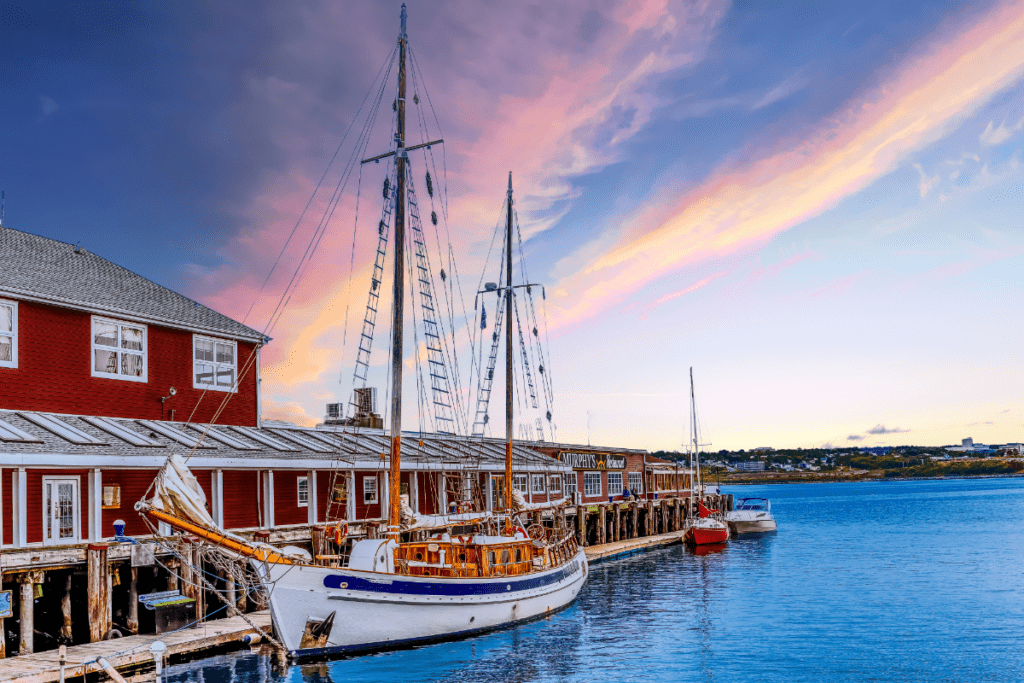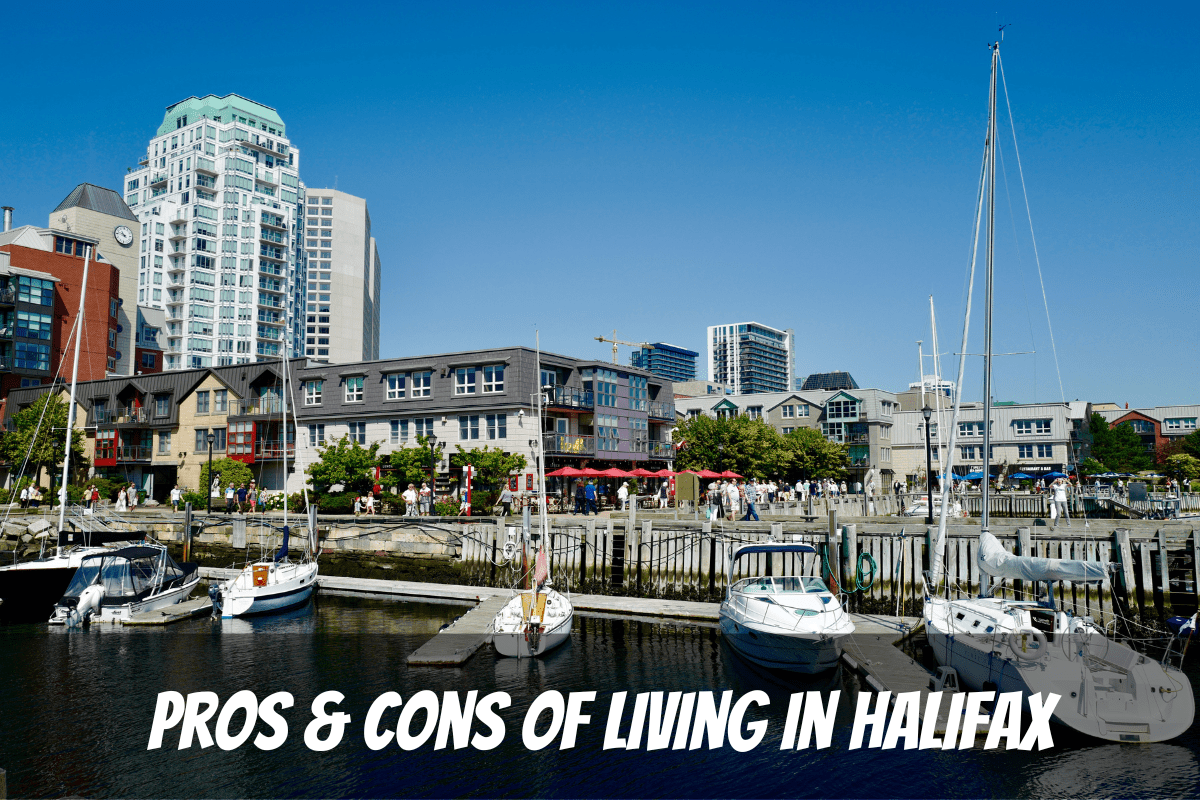Halifax has a beautiful location on the east coast of Canada and is probably my favourite Canadian city. If you are planning a move to Canada, and looking for a city that offers a good work-life balance, then Halifax is worth considering.
Halifax offers many of the benefits of a city but with easy access to rural areas and a less intense pace of life than larger cities.
We have started by giving you a few basic statistics below; then we discuss the pros and cons of living in Halifax.
1. Halifax Facts
Halifax is the provincial capital of Nova Scotia, the largest of the maritime provinces. The population of Nova Scotia is just under a million, and the population of Halifax accounts for almost half of this.
| Halifax | |
|---|---|
| Province | NS |
| Population | 439,819 |
| Population Growth 2016/2021 | 9.10% |
| Population Born in UK 2016 Census | 5,900 |
| Time Zones | AST (UTC-4) |
| Elevation | 145 |
| Ave Cost Real Estate Jan ’22 | $560,237 |
| Sales Tax | 15% HST |
| Prov Income Tax Low Band* | 8.79% |
| Prov Income Tax High Band* | 21% |
| Crime Severity Index 2020** | 61.88 |
| Violent Crime Severity Index 2020** | 83.83 |
*Note: Provincial Income Tax is Paid in Addition to Federal Income Tax
** Canadian Ave 73.4 & 87.0 (Lower is Better)
2. Where is Halifax Nova Scotia?
Halifax is located on the western side of Nova Scotia, on the North Atlantic Ocean. The province is almost completely surrounded by sea and is connected to the rest of Canada via a small border with New Brunswick.
Nova Scotia is an area of great natural beauty and spectacular seascapes. It has a rocky coastline dotted with small picturesque coastal towns and small isolated sandy beaches in sheltered bays.
Inland, the province is a combination of lush farmland and forested rolling hills, and you will never be more than around 60km from the coast.
Halifax’s location is quite isolated relative to the rest of Canada, and the nearest sizeable city is Montreal. The drive from Halifax to Montreal will take you around 13 hours.
3. Halifax Culture
Halifax is less diverse than many Canadian cities with over 80% of the population of European descent. The level of diversity is increasing; in recent years Asia has overtaken Europe as the most common immigrant origin.
The people of Halifax have a reputation for being friendly and welcoming. It has a large student population (from 5 universities plus a community college) and a relatively high proportion of retirees.
4. What is the Weather Like in Halifax?
You may view the climate of Halifax as a pro or a con depending on your point of view.
On the positive side, it has quite moderate temperatures compared to most of Canada. This is due to its location on the ocean which heavily influences the climate.
Summers are pleasantly warm, and Halifax rarely suffers from the hot and humid weather that can make other cities uncomfortable. Winters are much milder than in almost all other Canadian communities.
However, the term “moderate” can only really be applied to the temperatures. The city has high precipitation levels year-round and it can be very windy. Halifax suffers from occasional hurricanes, and coastal fog is common, especially in the summer.
The mild winters can also lead to a freeze-thaw cycle which can result in dangerously icy conditions.
| Halifax | |
|---|---|
| Annual Rainfall (mm) | 1314 |
| Annual Snowfall (mm) | 154 |
| Ave Hours Sunshine/Day | 4.9 |
| Ave Jan Temp (DegC) | 19 |
| Ave July Temp (DegC) | -4 |
5. Is the Cost of Living Low in Halifax?
The cost of living in Halifax is quite low compared to many other immigrant destination cities. For example, the average property cost in Halifax is around half of that in Toronto or Vancouver. Property prices reduce further as you move away from the city.
On the downside, Nova Scotia has the highest sales tax in Canada and some of the highest income tax rates. Property taxes are also high.
6. Does Halifax Have a Strong Economy?
Halifax is a major economic centre in eastern Canada and the main business, banking and cultural centre for the maritime region. It has a high concentration of government service workers.
The city has a growing manufacturing base and is an important transport hub in eastern Canada. Largely due to its port and its international airport.
Nova Scotia and Halifax generally have a strong tourist industry, but this sector has been one of the worst hit by the COVID restrictions.
The municipality of Halifax has a strong economic growth plan with a population target of 550,000 by 2031 and a planned GDP growth of around 3% per annum.
Outside of the urban areas, Nova Scotia’s economy is mainly based on natural resources such as agriculture, fishing, mining and forestry.
Despite the growth in the economy, a common complaint about Halifax is the shortage of jobs. Wages are also lower than in many other Canadian cities. There are opportunities to be found, but you will need to research your job sector thoroughly to ensure that Halifax would be a good move for you.
7. Does Halifax Have Good Transport Connections?
Public transit within the city mainly relies on bus services. The city doesn’t have a subway or light-rail services, but these probably aren’t needed in a city of this size.
In addition to buses, there are also two ferry services in operation. The first of these runs from Halifax’s downtown waterfront to Alderney Landing, near Dartmouth’s downtown. The second service operates from the Halifax waterfront to the Woodside industrial area.
The bus services only operate within the city, and there aren’t any public transport options for travel outside of the city. You will therefore need a car if you plan to live outside of the urban areas or if you want to explore the rest of the province.
Traffic within the city isn’t a major problem, although the Dartmouth Bridge gets very busy during rush hour. Parking can be difficult within the downtown area, and one-way traffic systems can be very confusing for newcomers.
The Halifax Stanfield International Airport is around a 30-minute drive from downtown Halifax. The airport operates a large number of domestic flights, along with flights to international destinations such as Mexico, Cuba, the US and the Caribbean. There are also flights to 6-7 European destinations, but many of these operate only in the summer.
8. What Outdoor Activities Can I Enjoy in Halifax?
It is quick and easy to escape Halifax to enjoy the province’s lakes, forests, and pretty coastal towns. If you enjoy the sand and surf, there are numerous beaches just a short drive away.
For water-based activities then you have options for canoeing, kayaking, surfing and sailing. These can be enjoyed from Halifax or the surrounding areas.
Within Halifax itself, there is a good network of parks and trails for hiking, biking, cross-country skiing and snowshoeing.
The biggest of the parks is Point Pleasant Park. This ocean-front park lies just south of downtown Halifax. It has picnic areas, a boardwalk, historic ruins and almost 40km of trails.
If you like to downhill ski then the best option is to drive to Ski Martock, around 75km northwest of Halifax. It’s not quite the Rockies, advanced skiers will find it a little tame, but it’s a great beginner resort.

9. Does Halifax Have Good Entertainment & Nightlife?
Halifax is great for those that like eating and drinking out. It has a very high number of bars per capita and a great range of restaurants in the downtown and waterfront areas.
The large number of students gives Halifax a lively (some might say rowdy!) vibe, but this is mainly limited to weekends during the school year.
The city has great fresh seafood and some great fish restaurant choices. If you prefer to cook your own, then visit Halifax Seaport Market.
I don’t have much experience of the shopping areas, but the general opinion seems to be that the shopping options aren’t great, and many people will save their shopping for when they visit larger cities.
10. What Professional Sports Teams Does Halifax Have?
If you are a sports fan, then you have a few options for watching semi-professional teams. These are:
- Halifax Mooseheads in the Quebec Major Junior Hockey League (QMJHL)
- Halifax Thunderbirds in the National Lacrosse League (NLL)
- Halifax Hurricanes in the National Basketball League Canada (NBLCanada)
For those new to Canada, I would highly recommend that you try watching a game of ice hockey and/or lacrosse. Both are fast-paced and exciting to watch. But be warned, there is a high level of contact in both games, so they may not be for the faint-hearted.
11. Where to Live in Halifax
I have provided a few suggestions below for neighbourhoods you might want to consider.
Downtown Halifax is great if you want to be able to walk everywhere and love being in the centre of everything. As with most downtown areas, you will pay a premium, especially for property and rental costs.
Downtown Dartmouth is an alternative for those that like the downtown lifestyle but without the Halifax price tag.
Bedford lies at the northern end of Halifax. It has good access to everything as it is close to the highways. The amenities are great, and property costs are significantly lower than in the downtown areas.
Fall River (popular with Brits) is semi-rural, spacious, with lots of green space. It is outside the city, so you will need a car, but the highway access is good.
Hammonds Plains is popular with families. It is similar to Fall River but closer to Bedford and not as quiet.

12. Crime Rates for Halifax?
Halifax is considered a very safe city to live in. Its crime statistics are lower than national averages and considerably lower than for most other Canadian cities.
13. Lighthouses
I couldn’t finish an article on Nova Scotia without mentioning the lighthouses. Nova Scotia is home to over 160 historic lighthouses. The most photographed (probably in the whole of Canada) is at the pretty fishing village of Peggy’s Cove, just a 45-minute drive from the centre of Halifax.
14. What are the Pros and Cons of Living in Halifax
Pros of Living in Halifax
- Beautiful location
- Low crime rates
- Mild weather
- Relatively low property prices
- Good bars and restaurants
- Great seafood
- Friendly people
- Good work-life balance
- Range of outdoor activities
Cons of Living in Halifax
- High taxes
- Isolated location
- The shopping options are not great.
- Wet climate can also be windy.
- Jobs can be hard to find
Sources of Data Statistics Canada & Canadian Real Estate Association




